Foreclosure inspections can cost anywhere from a few hundred to over a thousand dollars, influenced by factors such as location and property condition. Potential buyers should be mindful of hidden expenses that can arise, impacting the overall investment. While foreclosure can harm financial health and credit scores, it may also present opportunities for astute investors willing to navigate the complexities involved.
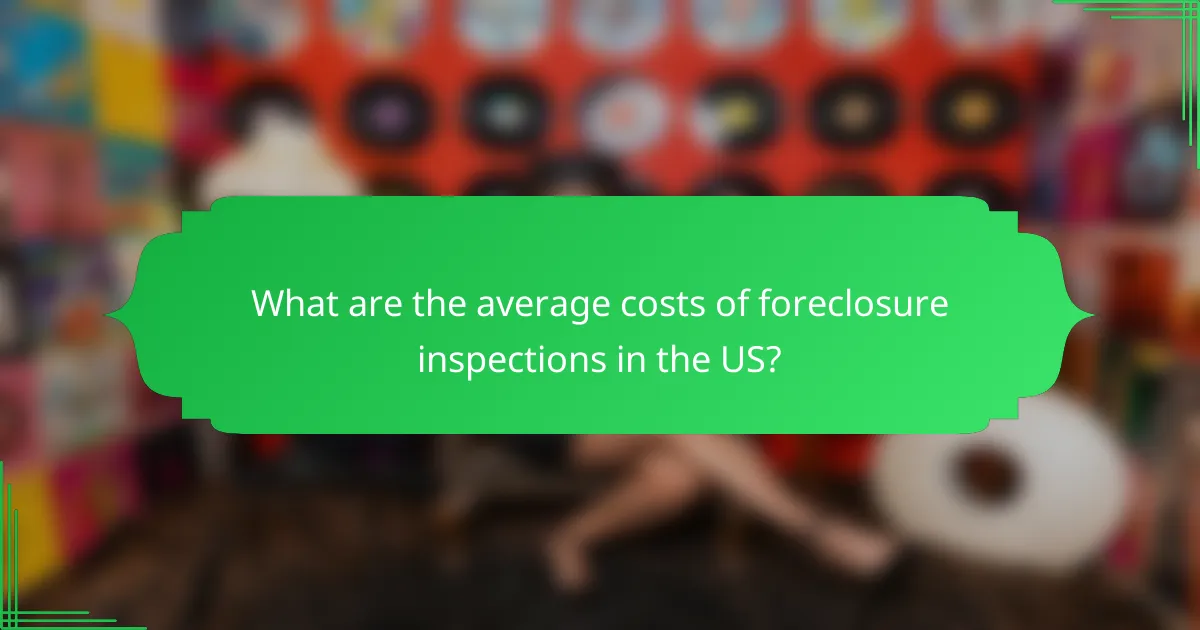
What are the average costs of foreclosure inspections in the US?
The average costs of foreclosure inspections in the US typically range from a few hundred to over a thousand dollars, depending on various factors. These costs can vary significantly based on the property’s location, condition, and the specific services required during the inspection.
Typical inspection fees
Foreclosure inspection fees generally fall between $200 and $600 for standard evaluations. More comprehensive inspections, which may include detailed reports or additional services, can reach upwards of $1,000. It’s advisable to obtain quotes from multiple inspectors to ensure competitive pricing.
Cost variations by state
Inspection costs can vary widely by state due to differences in the real estate market and local regulations. For example, inspections in states with higher living costs, such as California or New York, may be on the higher end of the spectrum, while states with lower costs of living, like Arkansas or Mississippi, may offer more affordable options.
Factors influencing inspection costs
Several factors can influence the cost of foreclosure inspections, including the size and condition of the property, the complexity of the inspection, and the inspector’s experience. Additional services, such as mold assessments or pest inspections, can also add to the overall cost. It’s important to clarify what is included in the inspection fee to avoid unexpected expenses.

What hidden expenses should buyers consider?
Buyers should be aware of several hidden expenses when considering a foreclosure property. These costs can significantly impact the overall investment and may not be immediately apparent during the initial purchase process.
Repair costs post-inspection
After a foreclosure inspection, buyers often face repair costs that can vary widely based on the property’s condition. Common repairs may include plumbing, electrical work, and structural issues, which can range from a few hundred to several thousand dollars. It’s advisable to budget for repairs that could amount to 10-20% of the property’s purchase price.
To avoid surprises, consider obtaining multiple quotes from contractors and prioritizing repairs based on safety and livability. A thorough inspection report can help identify critical areas that need immediate attention.
Legal fees associated with foreclosure
Legal fees can be a significant hidden expense in the foreclosure buying process. Buyers may need to hire attorneys for title searches, contract reviews, or to navigate any disputes that arise during the purchase. These fees can range from a few hundred to several thousand dollars, depending on the complexity of the case.
It’s wise to consult with a real estate attorney familiar with foreclosure laws in your area to understand potential legal costs and ensure all documentation is in order before finalizing the purchase.
Property maintenance expenses
Ongoing property maintenance expenses are another hidden cost that buyers should factor in. Foreclosed homes may have been neglected, leading to higher maintenance needs, including landscaping, pest control, and routine upkeep. These costs can add up to hundreds of dollars monthly.
Establish a maintenance budget that includes regular inspections and preventive measures to avoid larger repair costs in the future. Consider setting aside 1-2% of the property’s value annually for maintenance to ensure the home remains in good condition.
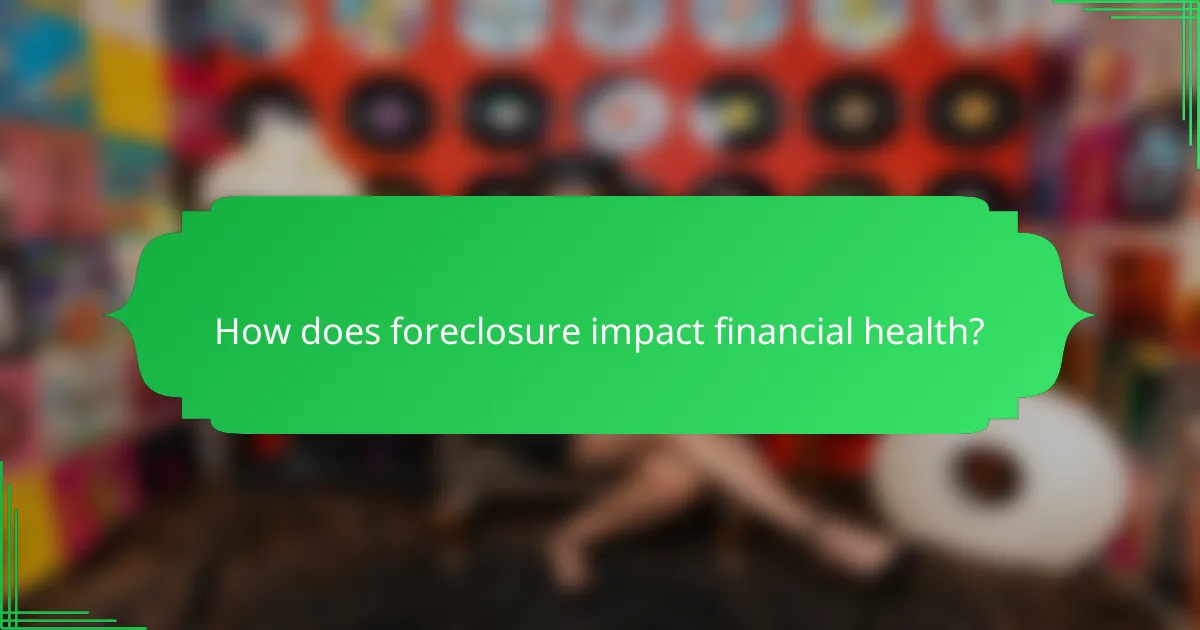
How does foreclosure impact financial health?
Foreclosure significantly affects financial health by damaging credit scores and limiting future borrowing options. It can lead to long-lasting financial challenges, but it may also create opportunities for savvy investors.
Effect on credit score
The foreclosure process can lower a credit score by several dozen points, depending on the individual’s credit history. This negative mark can remain on a credit report for up to seven years, making it harder to secure loans or favorable interest rates.
To mitigate the impact, individuals should focus on rebuilding their credit by paying bills on time, reducing debt, and monitoring their credit reports for errors. Engaging with credit counseling services can also provide guidance on improving credit health post-foreclosure.
Long-term financial implications
Foreclosure can lead to long-term financial difficulties, including higher insurance premiums and difficulty obtaining housing. Individuals may face challenges in securing rental agreements, as landlords often conduct credit checks.
Additionally, the emotional and psychological stress of foreclosure can affect decision-making, leading to potential financial missteps. It’s crucial to develop a solid financial recovery plan to regain stability over time.
Potential for investment opportunities
While foreclosure can be detrimental to personal finances, it may present unique investment opportunities for others. Investors often seek out foreclosed properties at lower prices, which can be renovated and resold for profit.
However, potential investors should conduct thorough due diligence, including property inspections and market analysis, to ensure that the investment aligns with their financial goals. Understanding local real estate trends can also enhance investment success.
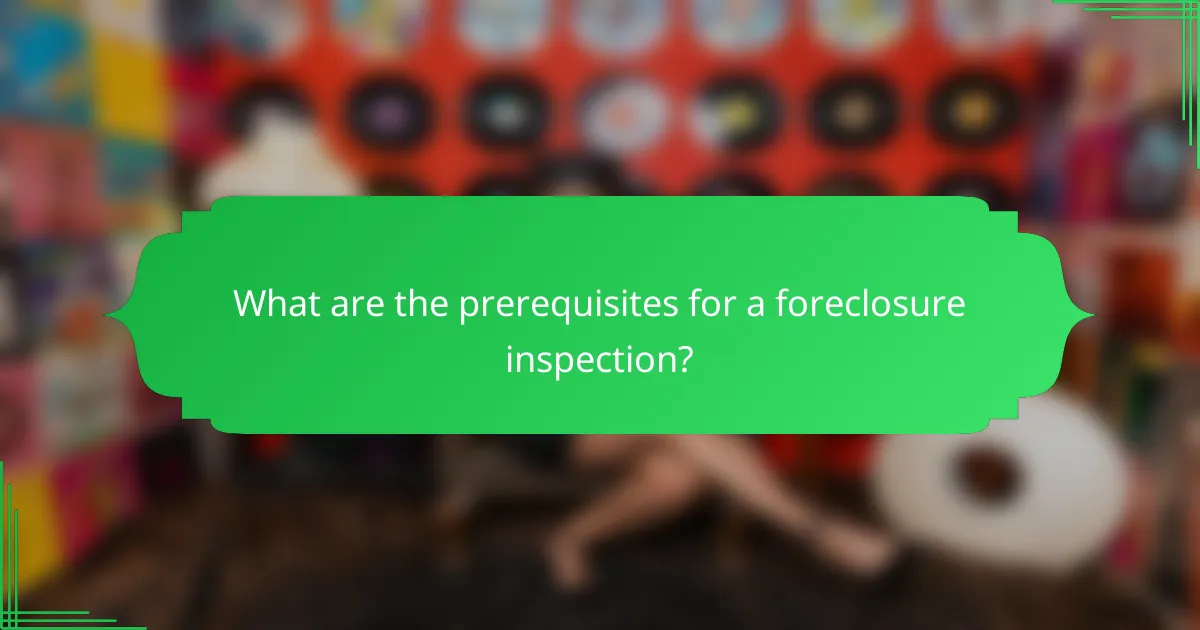
What are the prerequisites for a foreclosure inspection?
Before conducting a foreclosure inspection, it’s essential to gather specific documentation and select a qualified inspector. These steps ensure that the inspection process is thorough and compliant with local regulations.
Required documentation
To initiate a foreclosure inspection, you typically need to provide proof of ownership or authorization from the lender. This documentation may include a purchase agreement, a notice of default, or a court order, depending on the situation.
Additionally, having access to prior inspection reports and property records can be beneficial. These documents help the inspector understand the property’s history and any previous issues that may need attention.
Choosing a qualified inspector
Selecting a qualified inspector is crucial for a comprehensive evaluation of the property. Look for inspectors who are certified and have experience specifically with foreclosures, as they will be familiar with the unique challenges these properties may present.
Consider checking online reviews and asking for references from previous clients. It’s also wise to request a detailed estimate of the inspection costs, which can vary widely but typically range from a few hundred to over a thousand dollars, depending on the property’s size and condition.
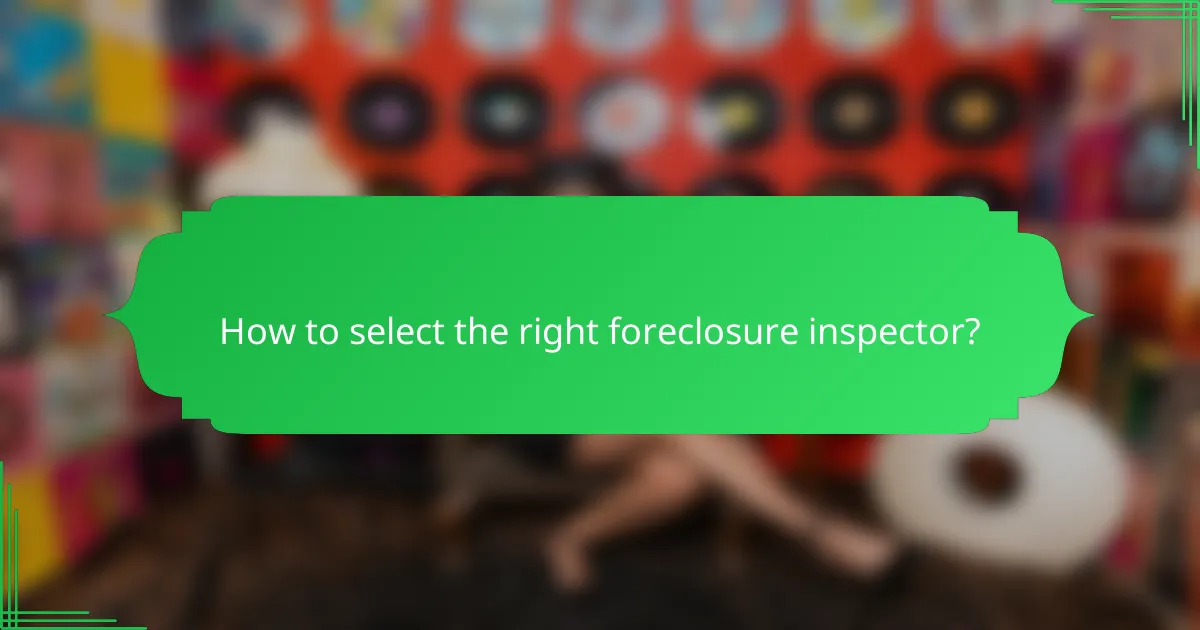
How to select the right foreclosure inspector?
Selecting the right foreclosure inspector is crucial to understanding the property’s condition and potential hidden costs. Look for inspectors with relevant experience and qualifications to ensure a thorough evaluation of the property.
Key qualifications to look for
When choosing a foreclosure inspector, prioritize those with certifications from recognized organizations, such as the American Society of Home Inspectors (ASHI) or the International Association of Certified Home Inspectors (InterNACHI). Experience in inspecting foreclosures specifically is also beneficial, as these properties can have unique issues.
Additionally, check for liability insurance and a solid track record of inspections. Inspectors should be familiar with local building codes and regulations, which can vary significantly by region.
Questions to ask potential inspectors
Before hiring a foreclosure inspector, ask about their experience with similar properties. Inquire about the typical duration of their inspections and what specific areas they focus on, such as structural integrity, plumbing, and electrical systems.
It’s also wise to request references from previous clients and to understand their inspection process. Ask if they provide a detailed report after the inspection and what kind of follow-up support they offer if issues arise post-inspection.
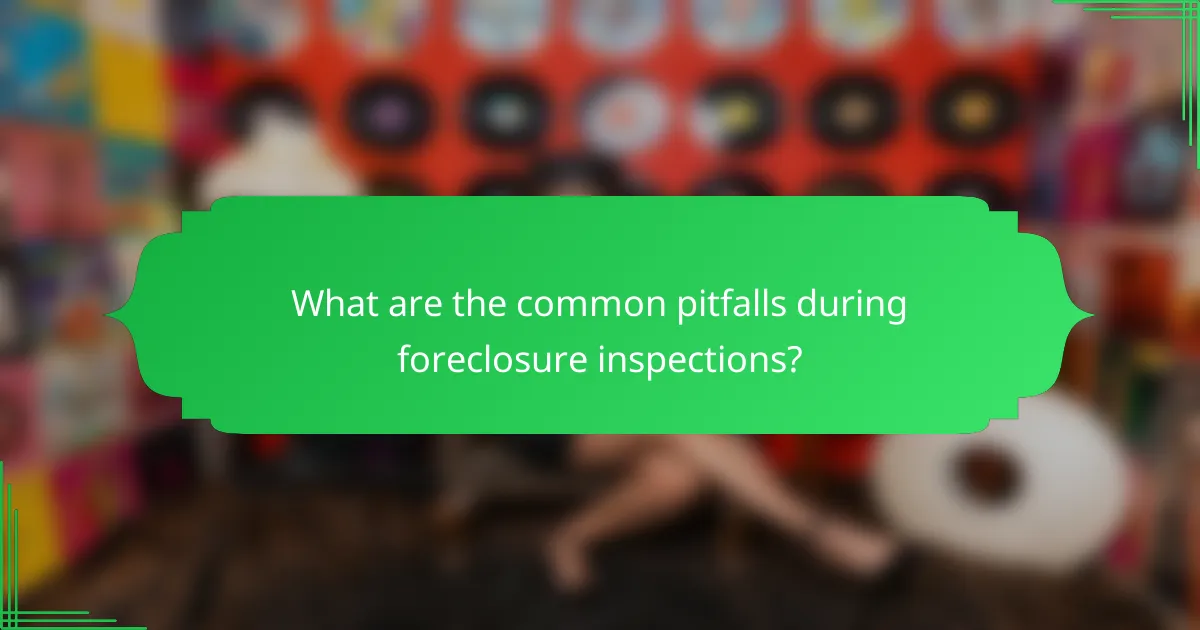
What are the common pitfalls during foreclosure inspections?
Foreclosure inspections can be fraught with challenges that may lead to costly mistakes. Common pitfalls include overlooking critical issues and misunderstanding inspection reports, both of which can significantly impact the financial outcome of a foreclosure purchase.
Overlooking critical issues
One major pitfall during foreclosure inspections is failing to identify significant problems within the property. Issues such as structural damage, mold, or pest infestations can lead to unexpected repair costs that may exceed initial estimates. Buyers should be particularly vigilant in inspecting areas like the roof, foundation, and plumbing systems.
To avoid overlooking critical issues, consider hiring a qualified home inspector who specializes in foreclosures. Their expertise can help uncover hidden problems that a casual inspection might miss. Always budget for potential repairs, setting aside a percentage of the purchase price for unforeseen expenses.
Misunderstanding inspection reports
Another common mistake is misinterpreting the findings of inspection reports. These documents can be technical and filled with jargon, leading buyers to either underestimate or overestimate the severity of issues. It’s essential to fully understand the implications of each item listed in the report.
To mitigate this risk, ask the inspector to clarify any confusing terms and provide a summary of critical findings. Additionally, consider consulting with a real estate professional who can help interpret the report and guide you on necessary repairs and their costs. This proactive approach can prevent financial surprises down the line.
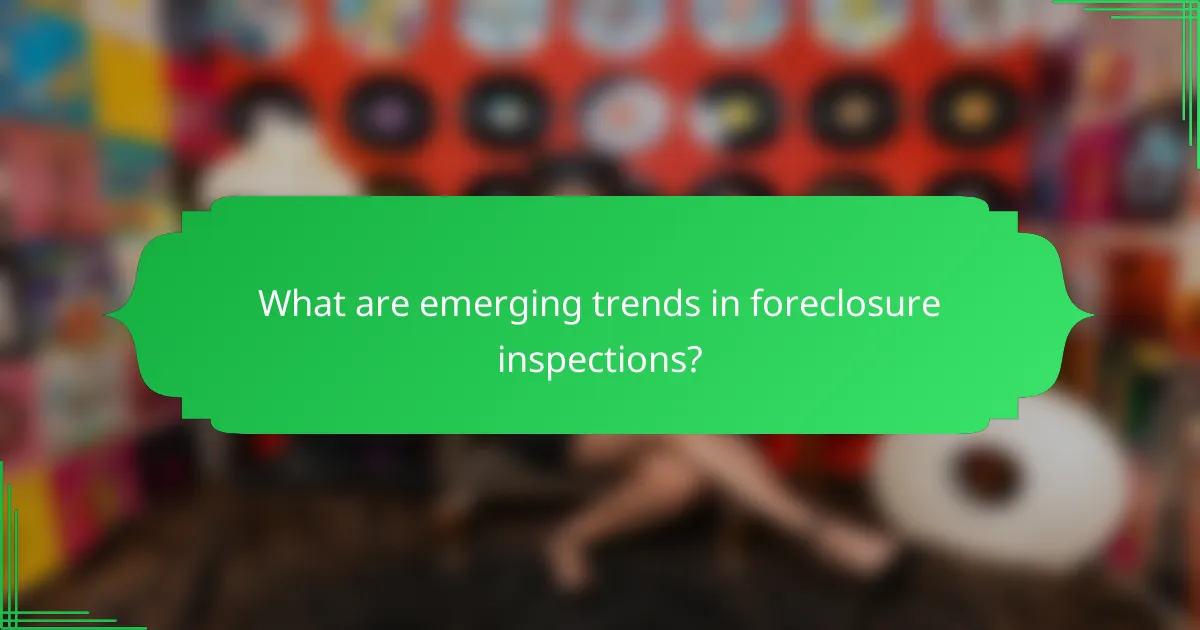
What are emerging trends in foreclosure inspections?
Emerging trends in foreclosure inspections focus on technology integration and increased regulatory scrutiny. These trends aim to enhance efficiency, accuracy, and compliance in the inspection process.
Average costs of foreclosure inspections
The average costs for foreclosure inspections typically range from $200 to $500, depending on the property’s location and condition. Factors such as the size of the property and the complexity of the inspection can influence these costs.
In some cases, additional services like mold assessments or pest inspections may incur extra fees. It’s essential to budget for these potential add-ons when planning for a foreclosure inspection.
Hidden expenses in foreclosure inspections
Hidden expenses in foreclosure inspections can include costs for repairs, legal fees, and additional inspections. Often, properties in foreclosure may require significant repairs that are not immediately visible during the initial inspection.
Homebuyers should also consider the potential for unexpected costs related to title searches or liens on the property. These expenses can add up quickly, so thorough due diligence is crucial.
Financial impact of foreclosure inspections
The financial impact of foreclosure inspections can be significant, affecting both the purchase price and future investment in the property. A comprehensive inspection can reveal issues that may lead to renegotiation of the sale price or additional repair costs.
Investors should weigh the costs of inspections against potential savings from avoiding properties with serious problems. Understanding the financial implications can help buyers make informed decisions and avoid costly pitfalls.
